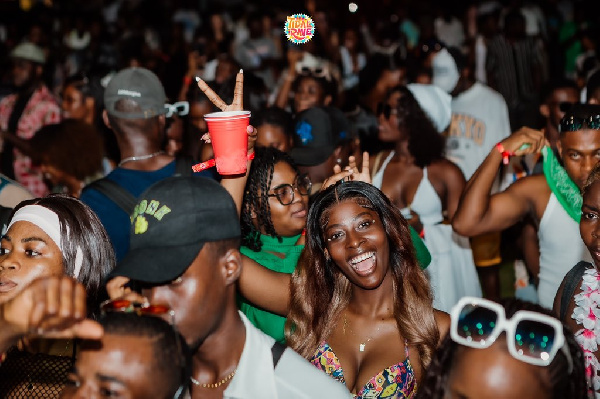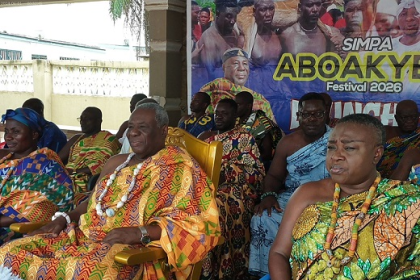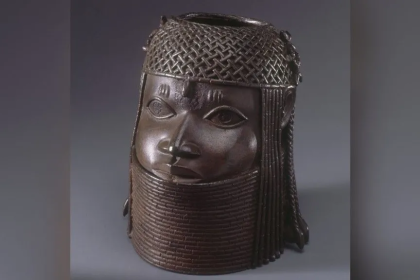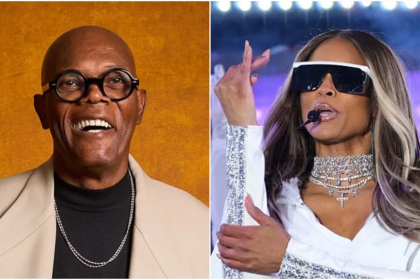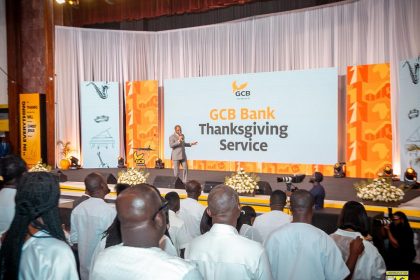The 2025 edition of the Tidal Rave Festival has cemented its status as Ghana’s biggest beach party, after two days of music, culture and youth energy at Accra’s La Palm Royal Beach Hotel over the weekend of November 14 and 15.
Under the theme “The Wild Card,” thousands of young revellers from Ghana and across the continent poured onto the beachfront as Afrobeats, highlife and electronic sounds rolled late into the night, turning the usually quiet stretch of sand into a packed carnival of lights, fashion and social media moments.
This year’s Tidal Rave was the 13th since the event began in 2011, and only the second time it has run as a full two-day festival at La Palm rather than a single-day beach trip.
The format shift, introduced when organisers EchoHouse moved the festival from Kokrobite to La Palm in 2024, is clearly paying off: the 2025 weekend blended daytime “culture village” experiences with a high-octane night-time concert, positioning the event as more than a show and closer to a youth culture summit by the sea.

The star attraction on Saturday night was a heavyweight line-up that read like a who’s who of current African pop. Nigerian hitmaker Ayra Starr, making her Tidal Rave debut as the first major non-Ghanaian headliner, shared the bill with Black Sherif, Gyakie, Moliy, Darko Vibes, GonaBoy and Olive The Boy, backed by DJs including DJ Vyrusky and hypeman Kojo Manuel.
Ayra Starr’s set, stacked with crowd favourites, was one of the most anticipated moments of the night. Her booking was deliberately framed by organisers as a symbol of the festival’s regional ambitions and its desire to “reinvent” the Wild Card edition with a broader African footprint.
Black Sherif’s appearance, coming in a year when his music has travelled well beyond Ghana’s borders, drew some of the loudest sing-alongs as fans chanted every word to his hits under a sea of phone lights.
Long before the headliners hit the main Rave Stage, the grounds of La Palm had already been turned into what organisers describe as a “playground of experiences.”
Beyond the music, the festival featured branded zones such as the Afro Exchange by Johnnie Walker, the Red Alert Experience by Absa Ghana and energy stations powered by Red Bull.
A “Black Star Experience” space, run in collaboration with the Office of the President, put Ghanaian symbols and imagery at the centre of the beach décor.
These zones, along with games, food courts and photo spots, were designed to keep crowds engaged from early afternoon right through to the final performances, and to reflect the way Tidal Rave has evolved from a simple bus-to-the-beach hangout into a multi-layered lifestyle event where brands, creators and fans co-create the atmosphere.
A key innovation this year was the deliberate decision to foreground what organisers call “Culture Currents” – a hand-picked group of Ghanaian creatives tasked with shaping everything from fashion and visual storytelling to environmental messaging on the grounds.
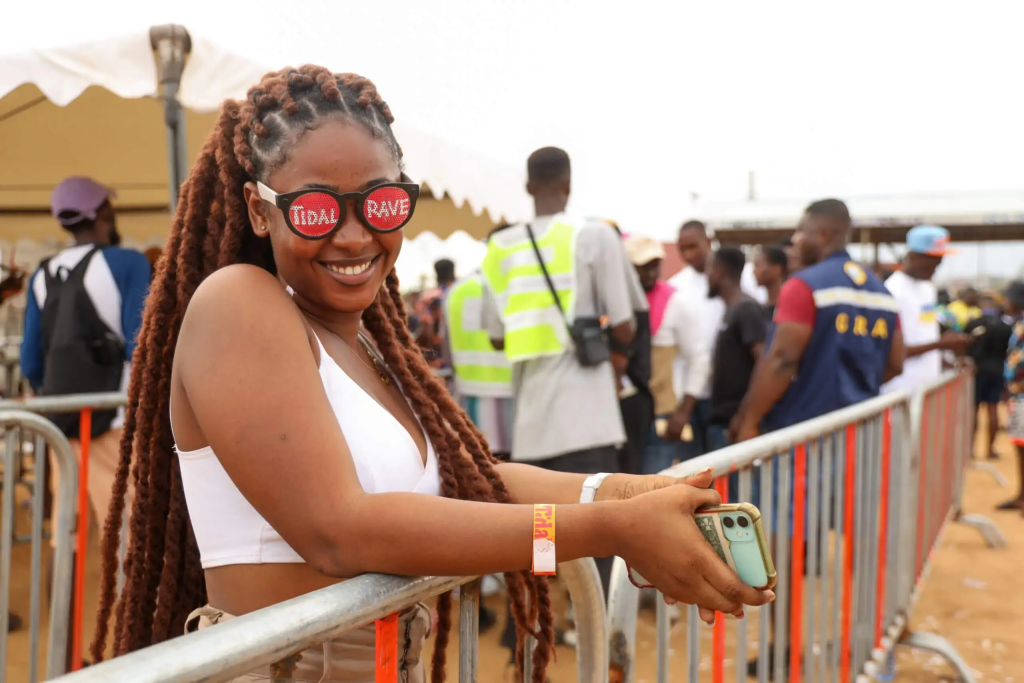
The squad included dancer Lisa Quama, media personality Rev Erskine, storyteller Samuella Graham, sustainability advocate Makafui “McKingtorch” Awuku and others, who helped curate installations, programme daytime content and influence how the festival looked and felt.
For many ravers, the 2025 experience began on Friday night with an exclusive pre-party powered by Johnnie Walker, which set the tone before Saturday’s main event.
That second day kicked off at noon with the Culture Stage, hosting emerging acts, DJs and MCs in a more relaxed, discovery-driven atmosphere as fans filtered through the gates, took photos and sampled food and merchandise.
As night fell, the focus shifted to the main Rave Stage for the marquee performances that kept the crowd on its feet into the early hours.
Behind the spectacle is a festival brand that has been steadily reinventing itself. When Tidal Rave launched in 2011 as a beach trip for university students to Kokrobite, it was essentially a once-a-year escape from Accra’s bustle, anchored by music sets and bonfire-style night parties by the sea.
Over the years it has grown into one of the defining fixtures of Ghana’s December-style events calendar, long before the “Detty December” tag gained global currency.
EchoHouse has used the platform to experiment with cashless payments, influencer-driven marketing and brand integrations that go beyond simple stage banners, drawing the attention of researchers and marketers interested in youth culture.
The move to La Palm Royal Beach Hotel brought better road access, hotel facilities and room for curated “villages,” but also signalled a desire to make the festival feel more central, both geographically and creatively, to Accra’s cultural life.
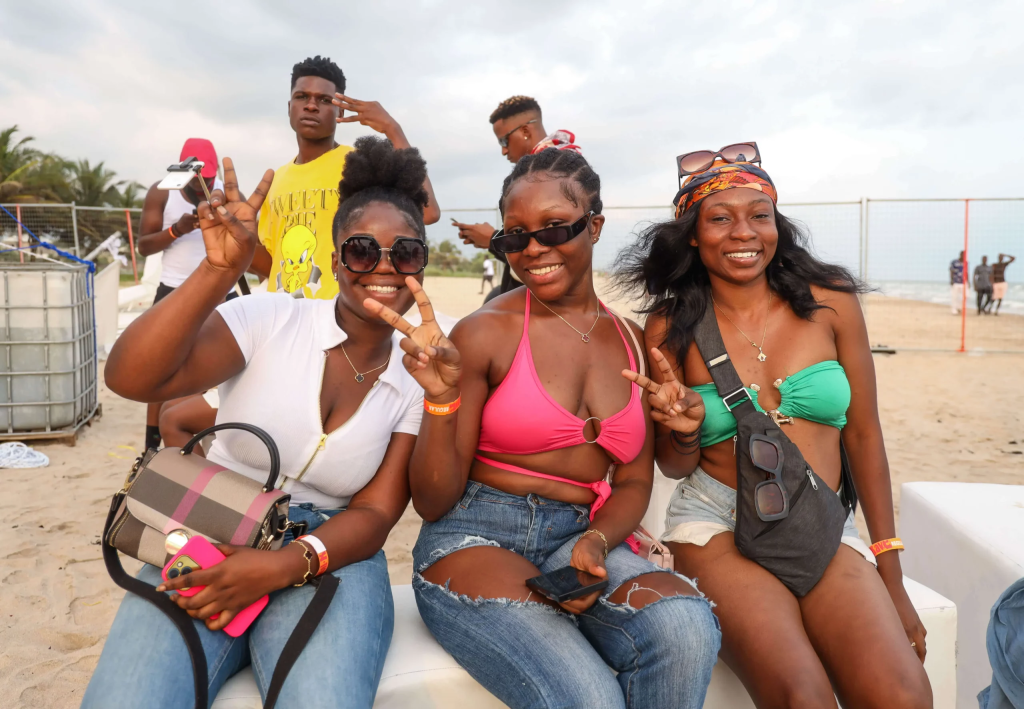
This year’s Wild Card edition leaned heavily into that ambition. In pre-event interviews, Event Director Awo Ampadu Somuah described the 2025 programme as an attempt to “shift the spotlight” from only what happens on stage to the broader eco-system of young DJs, fashion designers, digital creators and activists who drive Ghanaian youth culture.
On the grounds, that thinking translated into pop-up fashion shows, live content creation corners and visible sustainability nudges, including messaging around waste separation and responsible use of the beachfront.
The festival also doubled as a showcase of how brands are using music events to speak to young audiences. Breweries, telcos, banks and lifestyle labels were heavily present on site, offering everything from charging stations and games to discount tickets and giveaways linked to app sign-ups and digital campaigns.
For many companies, a few seconds on ravers’ phones via reels and TikToks is as valuable as a billboard, and Tidal Rave has become one of the most reliable ways to capture that attention in a concentrated burst.
Not everything was on a big stage. Social media over the weekend was filled with clips of surprise collaborations, crowd-surfing moments and a now-viral performance from Olive The Boy that got tongues wagging online, underscoring how fast Tidal Rave content travels beyond the physical beach.
For artists, a memorable set at Tidal Rave can introduce them to new fans far outside Ghana’s borders, especially as clips are shared by diaspora audiences who track Accra’s nightlife from afar.
Security, transport and crowd management have become increasingly important as the festival’s numbers have grown. Organisers worked with security agencies and private firms to control access points, while the La Palm set-up allowed for clearer traffic flows compared to the narrow roads into Kokrobite.
Buses, ride-hailing and car-pooling were all part of getting thousands of ravers in and out of the venue over two days, and early reactions online suggest that, while bottlenecks remain, many patrons felt the logistics were an improvement on earlier years.
By Sunday morning, as the last speakers went quiet and clean-up crews moved in, the verdict from many who attended was that Tidal Rave 2025 had delivered on its promise of a “Wild Card” weekend: unpredictable, high-energy and unmistakably youth-driven.
For Accra, the festival’s continued evolution underlines the city’s growing pull as a West African events hub, where local creativity and global Afrobeats energy meet on the shoreline.


